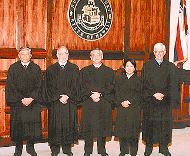10/5/2009
Hawaii Supreme Court Questions Laser Speed Gun AccuracyHawaii Supreme Court overturns appeals court decision that allowed police to use lidar without external calibration.

The Hawaii Supreme Court on Wednesday overturned a speeding conviction because the state failed to prove that its laser speed guns were functioning properly. On September 5, 2007, Honolulu Police Officer Jeremy Franks stopped motorist Abiye Assaye, accusing him of driving 90 MPH on the H-1 freeway. Because the charge of driving 35 MPH over the limit carried the possibility of jail time, Assaye was represented by a public defender.
At trial, Officer Franks gave the familiar and well-rehearsed testimony about how he had been properly trained in the use of the LTI 20-20 Ultralyte speed gun and how, in great detail, the device's self-test had been performed. As soon as Franks concluded that his lidar gun was "functional," Deputy Public Defender Summer M. M. Kupau objected that the state had laid no foundation establishing the accuracy or proper maintenance of the device.
The evidence showed that over the course of fifteen months, Franks used his lidar gun daily but never once had it checked or inspected by an expert. Instead, when it was not in use it was placed in the saddlebag of his motorcycle without concern for the effects of temperature and humidity on the device.
"The only maintenance that I do on it is clean the screen when it gets smudgy and change the batteries when they get weak," Franks testified.
Citing the precedent laid down by the court of appeals in the speeding case Hawaii v. Stoa, the trial judge believed that this evidence was more than sufficient to convict Assaye. He imposed a $787 fine, a thirty-day license suspension and 36-hours of community service. The Intermediate Court of Appeals (ICA) agreed, but the high court found the appellate reasoning faulty in light of a 2007 drug case.
"We hold that the ICA's decision in this case, and by implication its decision in Stoa, is obviously inconsistent with this court's decision in [Hawaii v.] Manewa insofar as Manewa requires the prosecution to prove that the four tests conducted by Officer Franks were procedures recommended by the manufacturer for the purpose of showing that the particular laser gun was in fact operating properly on September 5, 2007," Justice Paula A. Nakayama wrote for the majority. "Concluding that Officer Franks had tested the laser gun according to manufacturer recommended procedures would invite the same kind of assumption that this court expressly rejected as inadmissible hearsay in both Wallace and Manewa."
The high court went further to insist that police officers must demonstrate to the court's satisfaction that they are able to use a laser gun properly, instead of merely stating at trial that they took a four-hour course to obtain a certificate.
"Insofar as an officer's training is concerned, we hold that the same burden of proof is applied to the issue of whether the officer is qualified by training and experience to operate the particular laser gun; namely, whether the nature and extent of an officer's training in the operation of a laser gun meets the requirements indicated by the manufacturer," Nakayama wrote. "Therefore, without a showing of the nature and extent of the 'certification,' testimony showing merely that a user is 'certified' to operate a laser gun through instruction given by a 'certified' instructor is insufficient to prove that the user is qualified by training and experience to operate the laser gun."
Without an adequate foundation for the speed gun's accuracy, the supreme court found the case against Assaye "devoid of any evidence" and reversed his conviction.
View the ruling in a 100k PDF file at the source link below.


